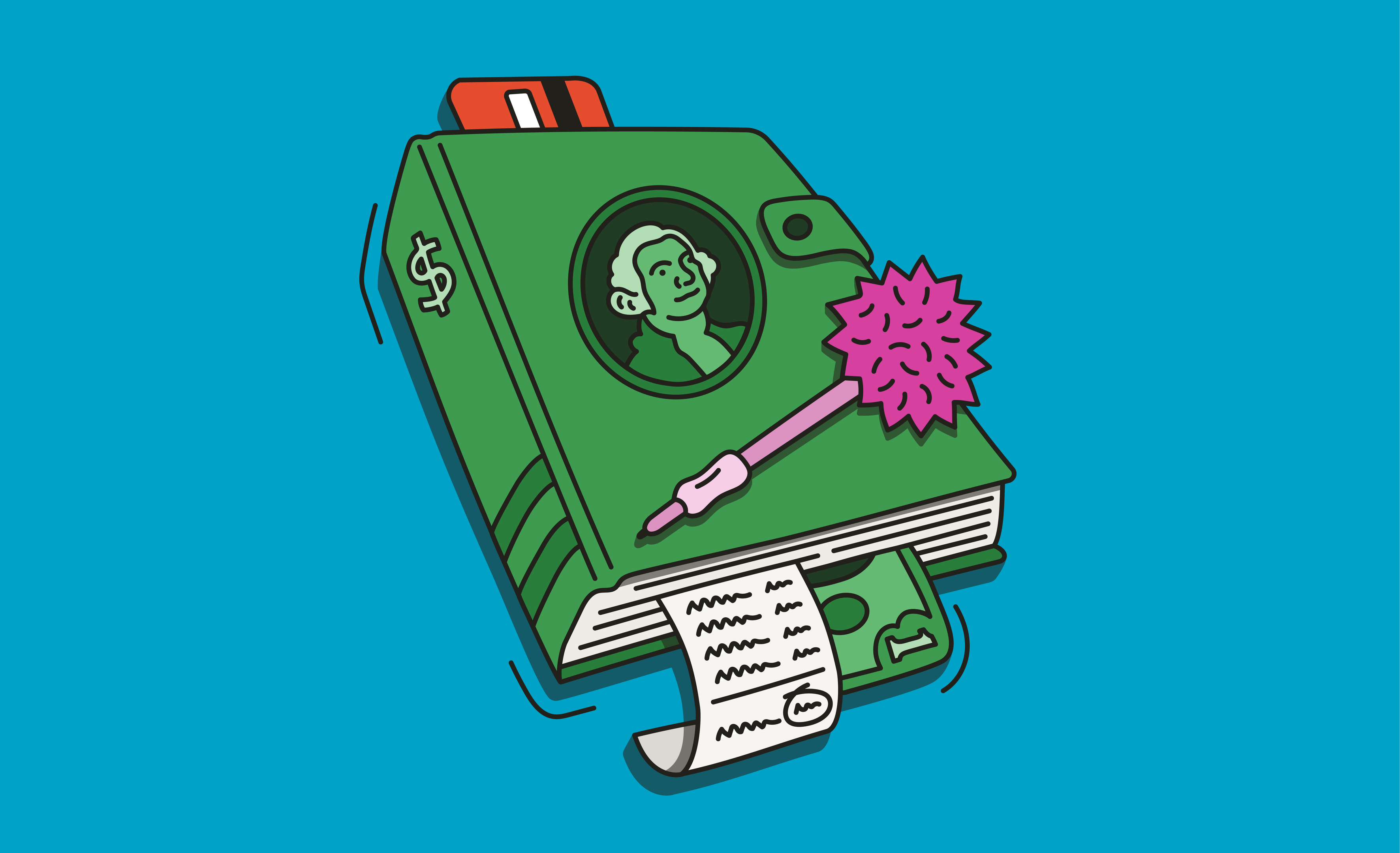As a couple—whether you’re married, engaged, or simply in a long-term relationship—it’s important to talk openly and honestly with your partner about the financial goals that matter to each of you so that you can come up with a plan together for how you’ll reach them.
According to a recent survey by AICPA, 73% of married or cohabitating Americans say that financial decisions are a source of tension in their relationship, with 47% admitting that the tension has negatively affected intimacy with their partner.
Creating a financial plan as a couple enables you and your partner to align on what you want to accomplish, and empowers you to make progress as a team. And bonus: When you’re working toward shared goals, it can help you both get (and stay) on the same page with your budget, too.
Whether you decide to keep accounts separate or combine them, you can still work towards shared financial goals. Below, we walk through the key steps involved in building a financial plan that will empower you to work toward your goals and continually improve your overall financial health.
Financial Plan vs Budget
Before diving into the steps for creating a financial plan, it’s first important to understand that a financial plan is not the same thing as a budget. Your budget and financial plan should inform each other, but they are different things with distinct purposes.
Generally speaking, a budget is a tool to help you understand and prioritize how you and your partner are currently spending money. It’s a short-term tool to make sure that you have the money necessary to cover your expenses and save towards your goals. With this in mind, most people budget on a weekly or monthly basis.
A financial plan, on the other hand, is meant to act as a roadmap for your life. It considers your starting point (where you are today) and your ideal destination (the financial goals that you want to achieve) and lays out a realistic plan to get you from Point A to Point B. This plan will likely involve managing your spending and saving with a budget, but it will also consider things like how you might grow your money through investments and how you might protect your finances with insurance. Ultimately, financial planning gives you and your partner a vision for where you’re headed so that you can have clarity on what actions to take today to make progress.
Steps in Financial Planning
Now that we’ve clarified the difference between a budget and a plan, let’s break down how to set up a financial plan with your partner:
1. Understand where you are now.
The first step in creating your financial plan is to sit down with your partner and understand your current situation. By knowing where you’re starting from, you can gain a better sense of what you need to do to reach your goals.
For example, maybe you and your partner have a shared goal of saving up for a down payment on a home, but you’ve had trouble finding room in your budget for savings and you’re not sure why that is.
By taking the time to sit down and go over your accounts, you might realize that the interest rates on your loans are much higher than you had originally thought, and those high rates are making it difficult to get ahead. Instead of using extra money in your budget to save for a down payment, you might decide to prioritize paying off your high-interest loans—saving money in interest payments and ultimately freeing up a lot more money in your budget to be used for building your down payment.
As a rule of thumb, this conversation should include:
Your Income
How much money do each of you bring in every month? Is your income consistent or does it fluctuate? Be sure to consider income from your jobs as well as any additional sources of income, such as investments, rental income, side gigs, etc.
Your Spending Habits
How are you and your partner currently spending money? Which expenses matter most to you? Which expenses are least important to you? Is there any mindless spending that can be cut to free up money for other purposes? How much is available for your goals each month?
Your Debt
How much debt do you and your partner currently carry? This should include all forms of debt including student loans, car loans, personal loans, mortgages, and credit card debt. In addition to knowing how much you owe, it’s also important to know the interest rate charged on each debt, as this will help you get a sense of the real cost of the debt. It will also help you prioritize which debt to pay back first.
Your Current Account Balances
How much money do you and your partner currently have set aside in various (non-investment) accounts? Be sure to consider your checking and savings accounts, as well as any money you may have set aside in a health savings account (HSA) or flexible spending account (FSA).
Your Investment Accounts
If you and your partner currently have investment accounts, note the balances in each of those accounts. Likewise, you should also consider how the balances are allocated to various investments (stocks, bonds, real estate, etc.). This will help you understand how much risk you and your partner are taking cumulatively in your investments. Be sure to consider any retirement accounts—such as your 401(k)s, 403(b)s, and IRAs—as well as any brokerage, custodial, or other accounts you may own.
Your Insurance Policies
If you or your partner currently own any insurance policies, it’s important to understand what type of insurance you have and the benefits and costs of each policy. In cataloging your insurance policies, be sure to consider health insurance, auto insurance, homeowners or renters insurance, life insurance, and disability insurance.
2. Set and prioritize your financial goals.
Now that you have a clear sense of where you are today, you and your partner are ready to discuss your financial goals. While long-term goals such as retirement are important and tend to get a lot of attention, it’s also crucial that you consider your short- and medium-term goals as well.
Not sure what your goals are just yet? That’s okay! Start by defining your core values as a couple. Some questions that can help guide this conversation include:
- What matters to you most in life? Think about the things that are most important to you. Some examples might include your family or friendships, your health, meaningful work, or the ability to make a positive impact.
- How do you want to live your life? Think about how you want to interact with the world and the characteristics you want to embody. Some examples might include curiosity, generosity, integrity, loyalty, or creativity.
By defining your core values, you can then think about the means necessary for the kind of life you want to live. In other words, your core values might influence the financial goals you set. For example, if one of your core values is a “sense of adventure,” then you and your partner might decide to take a year off from work to travel the world while you’re young—even if it means that your other goals might be put on pause to make it happen. Your core values can help you prioritize the goals that matter to you.
Some common financial goals for couples to consider discussing together include:
Building an Emergency Fund
An emergency fund is meant to be there to cover the unexpected expenses that life occasionally throws at us—and it’s also one of the most effective ways of reducing financial stress so that money is less of an issue between you and your partner. Many consider an emergency fund to be the bedrock of their overall financial plan.
If you don’t yet have one, it’s a good idea to consider adding it to your list of goals and aiming to set aside at least 3 months’ worth of take-home pay.
Here at Monarch, we recommend first setting aside one month of take-home pay in your emergency fund as a priority. That way, you’ll be prepared for many of the most common emergencies you might encounter. From there, you can work toward setting aside a full three to twelve months of pay, depending on your circumstances. For most couples, including those who own a home or have a family to take care of, a six-month emergency fund is often adequate.
Paying Off Debt
If you and your partner currently carry debt—particularly high-interest debt at 7% interest or more—paying it off can cut down on interest costs and free up money for other goals. At Monarch, once you have at least one month of take-home pay in your Emergency Fund, we recommend prioritizing paying off high-interest debt.
Buying a Home
If you’d like to own a home, it’s important to begin planning for the purchase in advance so that you can save for a down payment, closing costs, and moving costs. The same is true if you already own a home but intend to make significant home improvements.
Growing Your Family
Do you and your partner hope to start a family one day? If so, what would this look like for you? Will one or both of you be out of the workforce for a time when the baby comes? Might it involve adoption, fostering, fertility treatments, or surrogacy? Would it require moving into a larger home with more space, or relocating from a city to a suburb? All of these are important considerations that may affect your financial plan.
Potential Career Changes
If you or your partner are considering a career change in the future, it could have a big impact on your financial plan. This is especially true if making that change would require an up-front investment (in the form of education, for example, or starting a business). Likewise, if such a career change would impact your income significantly (up or down), that should be accounted for as well.
Hobbies, Activities, and Passions
Your hobbies and passions are an important part of enjoying life! With this in mind, it’s important to make space for them in your financial plan.
Retirement
For a lot of people, thinking about retirement can be intimidating. After all, the idea of never working again and living entirely off of your savings can be a scary thought.
That’s why, here at Monarch, we like to reframe the conversation around what retirement means. Instead of being the moment you never work again, we see retirement as the moment that work becomes optional. But you and your partner might think about it differently—and it’s important to talk about your goals so that you’re on the same page.
When it comes to saving for retirement, we recommend that you contribute at least enough money to your employer-sponsored retirement savings plan to maximize employer matching contributions. After all, that’s free money—and the closest thing you’ll ever get to a guaranteed 100% return on your investments. From there, how much you save will depend on your goals and the unique vision you and your partner have for retirement, but aiming for 15%, including employer matching contributions, is a great rule of thumb.
Prioritizing Your Goals
Armed with your core values and your financial goals, the final step is to prioritize your goals based on what is most important to you as a couple, and based on which goals will help you build a strong financial foundation. We typically recommend picking at least two and no more than four goals to work on at one time, especially as you begin building your financial plan.
3. Create a budget that incorporates these goals.
Once you have your prioritized list of goals, you can create a monthly budget that will allow you to work toward these goals.
Start by tallying up your and your partner’s take-home pay. Then, create a list of all of your regular and recurring expenses. Be sure to include expenses that you might not pay on a monthly basis—such as your car insurance premiums, property taxes, etc.—that are typically paid every six months. (Just divide the expense by six and add it to your monthly budget to account for it.)
Next, subtract your expenses from your income to determine how much money you have left over to put to work toward your various goals. Use your prioritized list to determine how you want to divide this money across your goals.
Need some help prioritizing? Here are some quick recommendations to get you started:
- Work toward a one-month emergency fund to provide a baseline level of security.
- Purchase adequate health, homeowners (or renters), life, and auto insurance.
- Contribute enough to your employer-sponsored retirement plan to earn your employer match, up to 6% of your income.
- Work toward a full emergency fund while also paying down any high-interest debt. (We recommend a 50/50 split.)
- Once your high-interest debt is paid off, increase your retirement contributions to 10% of your income and continue to increase contributions by at least 1% annually until you get to 15%.
- Start thinking about other goals, like saving for your child’s college expenses or a down payment to purchase a home.
While you’re at it, now is also an excellent time to make a plan for any windfalls you and your partner may receive—whether they’re expected or unexpected. This might include work bonuses, tax refunds, vesting RSUs, inheritances, prize winnings, and more.
If you put them to use properly, these windfalls can make a big difference as you work toward your financial goals. But it’s also important that you enjoy them as well. You might, for example, agree that you’ll spend (and enjoy!) 10% of any windfall you and your partner receive while putting the other 90% of the windfall toward whatever goal is your highest priority at the time.
How often should you check in with yourself to gauge your progress and adjust your budget as you accomplish your goals? The sweet spot is usually somewhere between every three and six months.
Now for the last step:
4. Consider a Plan B.
Just like you should have a contingency plan for how you'll deal with an unexpected flat tire or serious accident before you embark on a road trip, it's also important to plan for serious issues—like a prolonged illness, disability, inability to work, or the death of you or your partner—that can derail your financial plan and jeopardize your family's ability to live the life that you want for them.
What does preparing for these possibilities look like? In most cases, it will involve a combination of disability and life insurance—the first, to protect your ability to earn income if you're unable to work; and the second, to provide for your partner and family if you're suddenly no longer around.
According to the Social Security Administration, approximately one in four of today's twenty-year-olds will experience a disability at some point in their lives that will leave them unable to work for at least a year. Yet, according to the BLS, only 34 percent of workers have access to long-term disability insurance through their employers (the number is slightly better, at 42 percent, for short-term disability coverage).
With this in mind, if your employer offers long-term disability insurance, we recommend that you take advantage of it and sign up during open enrollment. And if needed, consider purchasing additional coverage that can help you replace a greater percentage of your income if you find yourself unable to work, and which you can take with you if you change employers.
Likewise, you and your partner should consider purchasing private life insurance beyond whatever may be offered by your employers. While many couples will find that they need more, as a starting point we recommend that you purchase at least enough coverage to:
- Allot $25,000 to your final expenses
- Pay off any debt that won't be forgiven upon your death
- Fully stock your emergency fund if you have not finished building one
- Replace at least one full year of your gross income
Finally, it's important to recognize that there are non-monetary steps that you can take to prepare as well. Putting in place a will, power of attorney, and healthcare directive that all work to make your wishes known, can significantly reduce the stress your partner must handle in an already trying time.
Planning for Your Life Together
Whether you and your partner are engaged, married, or simply in a long-term relationship, taking the time to create a financial plan can help you start working toward the goals that matter to you both.
Looking for a tool to help you identify goals, track your spending, and budget your money? Monarch Money makes it easy to build a budget, track your expenses, and organize all of your accounts in one place—while providing an accurate picture of your financial health as you progress toward your goals.





